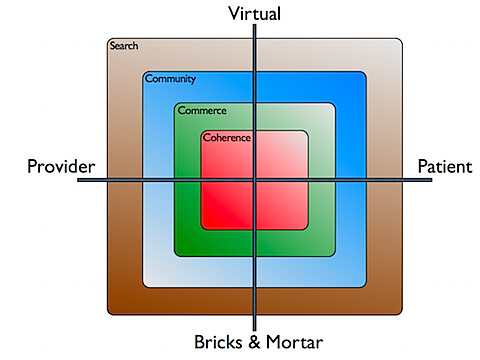HealthCampDc took place on Friday September 12th at CareFirst's DC offices. It turned out to be an amazing event. I hope some of the participants will add their comments to this blog to fill out this report and confirm the value they experienced.
The event was much smaller than other events I have been involved with such as SocialDevCampEast and BarCampRDU but that is to be expected when it is an event focused on a specific area - The transformation of the HealthCare industry.
A number of the barcampers at HealthCampDc were new to BarCamping. That didn't stop them jumping in with both feet and participating to the fullest.
The discussions flowed easily all day covering a range of topics. Here is the introductory slideshare that set the theme. I had planned to present about Open Standard Security but since the deck was already on slideshare we spent time on other topics.
Susannah Fox from the Pew Internet and American Life Project gave us an insight in to the challenges of conducting robust surveys that cover fast emerging areas, such as the impact of social networks on health information.
Jen McCabe Gorman lived up to her energizer bunny tag on slideshare by stimulating the conversation further by describing the virtual-bricks-and-mortar-provider-patient continuum (see the diagram below)

One of the messages that came through on multiple occasions was "build on existing behaviors and relationships - It's not all about the technology!" In one example the role of the barber shop in inner cities was cited as a great example of how a health education message was successfully disseminated using the influential role of the barbershop in the community.
Along those same lines it is important that we remember to design our message and services so they can be disseminated through multiple channels. Mobile is a critically important technology in this respect. It is the primary, often the only, contact method for growing segments of the community.
David Hale from the Library of Medicine at the National Institutes of Health gave a great demonstration of an Adobe Flex-based application that is close to release. The application is a drug identification tool that allows patients, physicians and other medical staff to explore the database of pill information by searching textually or visually, by shape, color or markings on pills.
How to stay connected?
A fascinating discussion took place where people shared how they stay on top of the torrent of information. The startling thing is that our peers are our number one source. Whether those are our physical colleagues or are contacts we have made across the vastness of the Internet. We get our best information by tracking others that we trust, or have some sense of shared community with. Beyond our peers the tools used include:
- Del.icio.us
- Google Reader
- Google Search
- Google Alerts
- RSS Feeds
- jing (in beta)
- Summize (search.twitter.com)
When it comes to technology, Trenor Williams made a very telling comment that I will repeat as best I can here. "Our newest generation of care givers are incredibly tech savvy but nobody is equipping them with the skills to translate that knowledge so that it can be used to improve care delivery."
Wow! That thought has been bouncing around in my head every since I heard it. It goes to the issues in education and how we are equipping our school and college graduates to be able to filter, analyze and apply the growing flood of information and tools that they have at their fingertips.
Discussions through out the day focused around engagement. How do we engage the community? How do we engage the providers? How do we engage the legislators?
Another theme that emerged during the day is that each participant at one point or another felt "kinda stoopid" what we realized by this was the fact that the HealthCare continuum is so vast that we can't be experts in everything. The problems in the HealthCare industry are also so big that no one company, not even game changers like Google, can solve the problem alone. We all have to work together to make change happen.
Despite the scale of the challenge being so great one realization was reached. The Washington DC area is at the epicenter of the transformation of HealthCare. All the major providers compete in this market. Major Provider networks operate, researchers are here, Venture Capitalists are here, Technologists are here, charities representing critical diseases have representation here and the politicians and Federal operations that will pass legislation that will drive change are here. Everyone is in this market. The Washington DC are has all the elements to be the epicenter of Health 2.0.
From this realization came the commitment for each participant at the event to spread the word and bring along influential change agents to the next HealthCampDc event that will take place in early 2009. For those that can't wait until then there will be a HealthCampNy event at the Web 2.0 Expo in New York on September 17-18th. Jen McCabe Gorman is busy helping to organize the Health 2.0 Conference in San Francisco on October 22nd-23rd. I very much want to be there and would like to organize a HealthCampSf on Friday October 24th. Is anyone interested in helping make that happen? Can you help provide a venue? Let's make it happen - leave a comment here or ping me on Twitter.

Thanks, Mark! I loved being part of Friday's discussion -- it was definitely a "top 5" event for 2008 for me in terms of the insights gained in a short amount of time. I posted about Jen's diagram on e-patients.net if you have time to check it out.
ReplyDelete